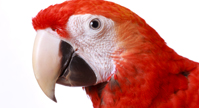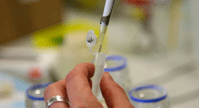Frequently Asked Questions (Canine)
What is DNA?
This acronym stands for Deoxyribo-Nucleic-Acid. It is a long, complex molecule carrying information in the form of a chemical code and dictates how the body and cells should form.
What is the best kind of sample to send for testing?
For animals under 6 weeks and not weaned, a dewclaw or blood sample is strongly recommended. Blood samples can be collected from the end of a clipped toenail and placed on filter paper or a cotton q-tip (bud). Dewclaws must be dried and sent in a paper envelope.
For animals over 6 weeks and weaned we recommend a buccal swab sample. Please place samples in paper envelopes and avoid placing samples in plastic bags or containers. It is important to remember that the quality of the sample submitted to the lab is extremely important in the entire testing process.
How do I collect a sample from my dog?
Please see our Canine Sample Collection page for more information about collecting blood, cheek and dewclaw samples.
How many swabs and what kind do I need to send?
Generally we need one swab for all testing. Our collection kits contain two swabs to ensure that we have enough template material and have an extra swab if needed. If you are running multiple tests on your dog it is NOT necessary to submit more than one sample.
Can the DNA in mothers milk effect a test result?
Yes! This is why we strongly encourage people not to use cheek swabs until puppies are weaned.
Is there a minimum age for testing a puppy?
No, we can test from birth. But since puppy's mouths are small, it can be difficult to obtain a cheek sample from a swab. Therefore, for puppies under 6 weeks old and not weaned, we recommend submitting a blood sample or dewclaw.
How much does it cost?
The cost for each test is listed on the specific web page as well as on our complete pricing test list.
How can I pay for my testing?
Payment can be made by credit card, check, money order, or PayPal (PayPal@animalgenetics.us). Check should be in US dollars and be made out to Animal Genetics. For credit card payments, you may either write your credit card number on the form or call us to make payment. We accept all major credit cards including Visa, Master card and American Express.
How do I obtain my results?
Results are available by e-mail. All tests are certified free of charge, hard-copy or PDF is sent soon after results are reported.
I live outside the U.S. Can I still send samples for testing?
Yes, We get thousands of samples from countries around the world. Please follow sample collections instructions.
How long does testing take?
Results will be made available within 3-5 days of receipt of samples.
My test result came back as "No Result" -- what does this mean?
There was not enough DNA available on the sample for testing. There is no cost to retest -- send a new sample marked "Retest" and we will do a new test for you at no additional charge.
Do I need to test my dog for all of the genetic disorders?
No, most of the genetic disorders listed are breed specific - meaning that only a few breeds may actually have a certain disorder. The breeds that are affected by each disorder are listed on each disease page, and you may always contact us if you have any other questions.
Do you offer any discounts on multiple tests?
Yes, we offer some discount rates for samples. Please see our Canine Fee Schedules for prices. Additionally, we occasionally release promo deals via our Facebook page.
I have English Bulldogs, what should I test my dogs for?
Many people are interested in testing a dog to see if they carry either the "blue gene" or the "chocolate gene". The "blue gene" is really a misnomer, as the dilution gene dilutes all types of pigment.
I have an Australian Shepherd, and I would like to see if he is Red-Factored, or will produced red offspring. What should I test for?
In Australian Shepherds, the B-Locus determines if a black or blue dog will be able to produce red offspring. If the dog tests B/B, he does not have the red gene, and will never have red offspring. If the dog tests B/b, he does carry the red gene. Breeding to another carrier or to a red dog should produced red offspring. Dogs that are actually red will test b/b. If you wish to test your dog for the red gene, please mark the B-Locus box on your submission form. If you would like us to send you out any free submission kits, please click HERE.
I have a Black Labrador, and I would like to know if he will throw color, what should I test for?
Labradors have several combinations of genes that play a role in coat color. The first is the E-Locus. This gene determines if a dog can produce black pigment, or yellow pigment. The allele for black pigment is the "E" allele, and is dominant over the recessive yellow "e" allele. A black lab can be "E/E" or "E/e" and appear black. A dog that is "E/e" can pass on the gene for yellow coat color.
Can you determine the breed of my dog?
No, we currently do not offer breed testing.
Why is my sample "On Hold"?
There is a problem with the payment for the sample. Please make a payment or contact us for assistance.
I can't get the submission form to print, what should I do?
Simply print 1) your contact information - name, address, phone number and email address -- and 2) breed of dog 3) dog's ID and 4) test requested on a piece of paper and submit with your sample.
Submit a Sample for Testing:
To submit a sample for testing please go to test now.
To order a sample collection kit please go to order sample collection kits.










